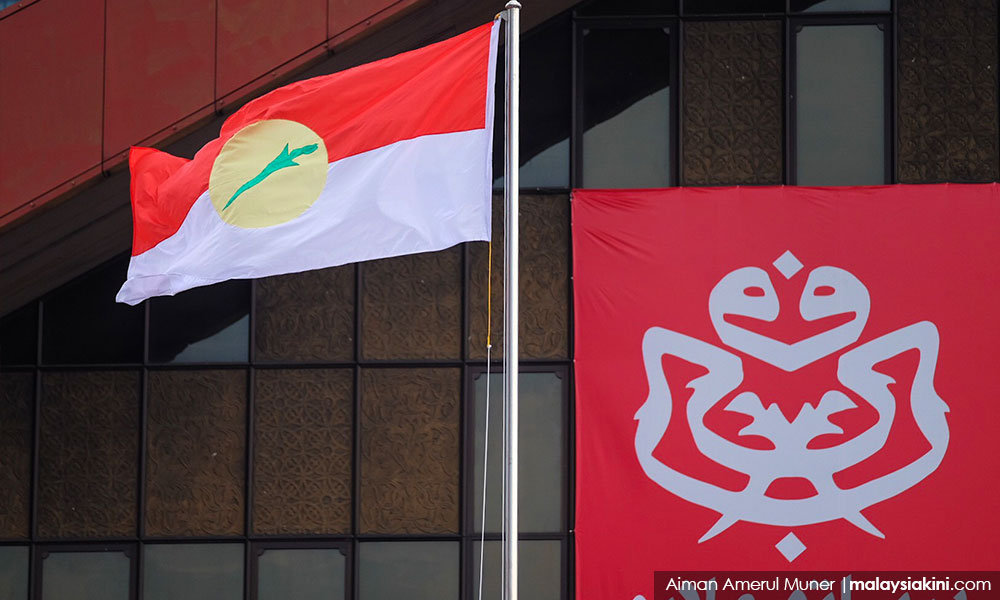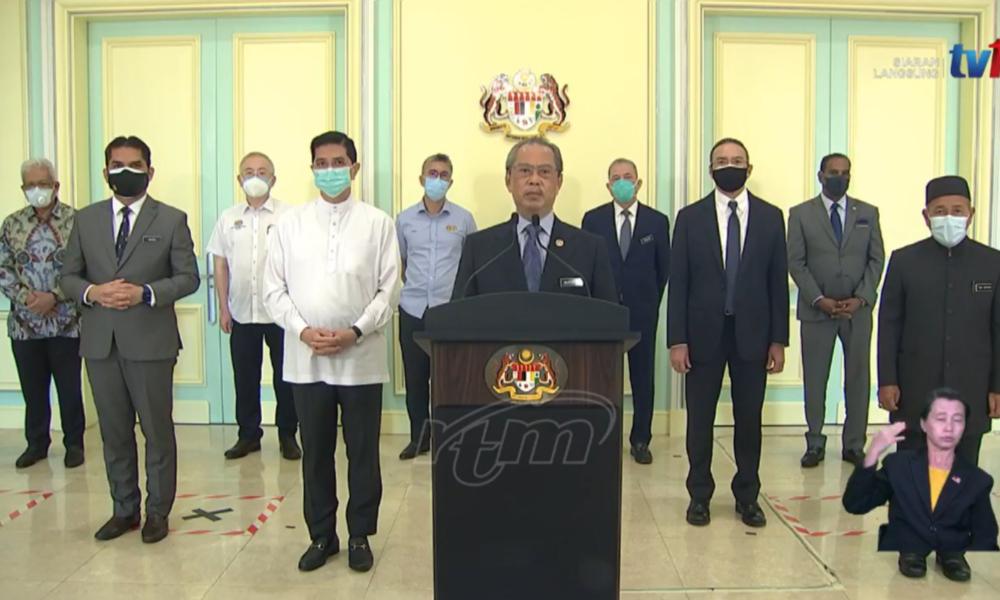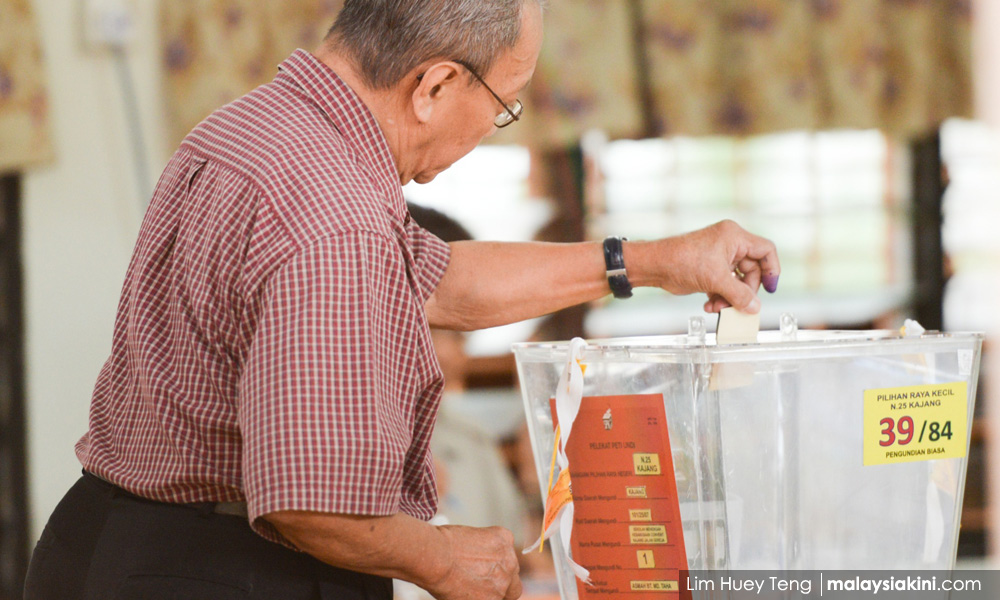This article will not cast a single aspersion on the person of Tony Pua.
Whatever our own feelings, the Damansara MP is a Malaysian and a human being who deserves the same respect as everyone else.
To an extent, we must of course also respect the decision of anyone to go against the grain - this is not easy to do.
All I will attempt in this article is to go through the arguments he put forward with regard to whether or not Prime Minister Muhyiddin Yassin’s offer should be explored by the opposition or not.
The points are of course to some extent moot, as within some 15 hours or so of the PM’s offer, every single opposition party - including Pua’s DAP - has firmly rejected the offer.
I think Pua’s first problematic framing is his articulation of only three possible paths forward - namely: unending political turmoil, an Umno PM, or a general election.
I find this somewhat curious and odd. At best, it demonstrates a serious lack of imagination; at worst, it is a deliberate omission of obvious alternatives.
Pua’s argument is that Umno president Ahmad Zahid Hamidi “swore that he will never support (opposition leader) Anwar Ibrahim as PM”.
I’ll be the first to admit that Zahid supporting Anwar is an unlikely outcome. If it were to happen, it would have happened by now, probably.
But to jump from that likelihood to concluding that the only new PM will emerge from Umno is quite a leap.
I think it can still be considered reasonable for someone to argue that the next PM is most likely (relatively speaking) to come from Umno; but it is in my view very unreasonable to state that the next prime minister will only come from Umno, given the diverse landscape and a high number of possible permutations.

Pua also completely omitted solutions based on previous precedents. In 1969, a national crisis precipitated the transfer of power from Parliament and the cabinet to a national operations council (Mageran).
However likely or unlikely this may be (a subject certainly open for debate), it should not be omitted willy nilly from the list of outcomes.
In fact, a friend commented that Pua’s argument of compromise for the sake of stability is startlingly reminiscent of his best friends: the MCA.
They are famous for putting up with all sorts of compromises merely for the sake of ‘stability’, and they love to talk about how voting for the opposition will throw the country into utter chaos. In those days, the MCA line was - vote DAP and PAS will come into power. Now Pua is saying, deal with Muhyiddin, or Umno will come into power.
Pua has always had choice words for MCA, so it is a little unfortunate that he now employs the same fearmongering and rhetoric about stability and ‘saving Malaysia from chaos’.
Severe trust deficits
Pua is correct that term limits, anti-hopping laws, and parliamentary reforms are all good things.
But for all of Muhyiddin’s present credibility, in making these offers, he might as well be offering to put RM1 million in the bank account of every Malaysian.
It is important to note that Muhyiddin is not offering some sort of arrangement wherein one accepts his offer today, and these things come to pass tomorrow.
Indeed the first two promises require a two-thirds majority in Parliament. Can we even trust Muhyiddin to deliver the MPs purportedly on his side to make this happen?
Let us not forget that on Saturday, we had ministers and other MPs on Muhyiddin’s list saying they were not consulted at all about the promises that Muhyiddin made.
If even ministers were not consulted and had not given their consent to his offer, should we really believe that Muhyiddin - who has already lost the support of tens of MPs and counting - can later on deliver his portion of the votes needed to pass a motion requiring two-thirds support in Parliament?
Don’t forget, in this transaction, the opposition pays in full upfront (by supporting Muhyiddin as PM), with no guarantee whatsoever that the goods ‘bought’ with their vote of confidence will be delivered in the end.
The same goes for Pua’s contention that “all future bills… will be passed in an inclusive fashion” where “opposition members actually get a say in it.”
If you really boil things down to the fundamentals, this would mean that the opposition is not an opposition at all. I would define things such that people who get a meaningful say in future bills, the budget, and so on are essentially part of the government.
Pua writes “Some are adamant that we must bring down the traitors. It’s hard not to share this sentiment. But we will bring them down… And I’m very certain and confident the rakyat will kick out those who betrayed their mandate in 2018 and return the right coalition back into power then. That will be the sweetest of revenge.”
(With regards to the last line, I feel called to issue a gentle reminder that this is real life, not a comic book.)
This seems to indicate that Pua wants Muhyiddin and his government to negotiate with the opposition in good faith with regards to passing bills and managing the country, all while waiting to do a battle to the death in the next elections?
Could you sit at a table, and really work together in good faith with people who have openly said they are going to kill you next week?
If you had to cooperate with people who have made such threats publicly, would you be putting your best foot forward to achieve common goals? Or would you be spending all your time and energy scheming to kill them before they kill you?
If I were Muhyiddin, there is no way I would trust people who are openly talking about getting their ‘sweetest of revenge’ on me.
Peanut bribes?
I would like to pick up on another odd turn of phrase used by Pua: “Let’s be frank. Muhyiddin didn’t offer peanuts that even monkeys will reject.”
Perplexing language/analogy aside, let me put on another hat here, that of a communications consultant dealing in public perception.
Now, most consider Pua to be of impeccable integrity, and for multiple reasons, not susceptible to bribes.
But one must consider how it looks when MPs in general appear receptive to Muhyiddin’s plan.
Is it unreasonable for the public to think: Is my MP only taking up this offer so they can get benefits like increased allocations, better perks as an opposition member and so on?
Of course, this perception issue is essentially a problem with Muhyiddin’s offer itself. Promises of reform were packaged inseparably with what looked to a lot of people like bribes, such that you essentially can’t have one without the other.
This package being all-inclusive opens MPs up to all sorts of unsavoury speculation.

Pua goes on to say:
“Some of my comrades say that the PN government is weak and desperate, that’s why they are now making these offers. Well, if they are strong, why should they? And if they are indeed weak and desperate, isn’t that the best time to be negotiating with them?”
The short answer is: no, it is not.
I think in the case of Altantuya Shaariibuu’s murder, some commented that the accused policeman who implicated Najib Abdul Razak would 'say anything' in order to get out of death row.
As to the question of why someone should negotiate from a position of strength, the answer is quite simply: because that is when you are most credible.
People who are weak and desperate are anything but credible, and will promise you the moon and the stars in order to escape their fate.
If Muhyiddin and his team were the type of people who kept their word, there would have been no Sheraton Move to begin with. It boggles the mind that anyone would suggest trusting the exact people who betrayed everyone’s trust in the most public of spectacles.
Castles built on air
Pua concludes by saying:
“Let us now count the potential benefits to the rakyat - we end the political turmoil and impasse; we block the return of the kleptocrats; we prevent a general election in the middle of the pandemic; we get the PN government to institute priceless reforms; we get an equal say in passing all bills and finally, we’ll get to kick PN out in a general election to be held about 10 months away.”
I humbly posit that Muhyiddin’s offer guarantees absolutely none of the above.
There is no guarantee that it will result in stability; with only empty promises from someone who has already stabbed you in the back once, we could far too easily find ourselves right back at square one in months or even weeks.
It is almost laughable to think that this will ‘block the return of the kleptocrats’, as perpetuating Muhyiddin’s government means perpetuating the likes of Azmin Ali and the government that has allowed so many politicians charged with corruption to get off scot-free.
There is no guarantee that Muhyiddin, with his renewed majority, will not dissolve Parliament and call for elections at any time, which is entirely his right.
There is no guarantee that PN will institute any of these reforms, ‘priceless’ or not. Once again, you only have the promise of a man who cannot even maintain support for his own premiership, to say nothing of marshalling two-thirds of parliamentary support for promises he has not even notified his own allies on, much less gotten their buy-in for.
There is no guarantee you will get an equal say in anything, much less in the passing of bills. What is being sold to you today as ‘an equal say’ may turn out, in the end, to be little more than those increasingly ubiquitous ‘advisory committees’ that are there for show and legitimisation only - their precious advice never adhered to.

Lastly, there is certainly no guarantee that you will kick out anyone in any general election. This contention is for all means and purposes a little more than fantasy. Furthermore, Muhyiddin would have to be a fool of epic proportions to let those who pose such a threat to him electorally into his inner circle of decision making. If he did that, his own allies would feed him to the lions.
Muhyiddin’s gambit is (perhaps ‘was’ is more accurate at this point) the political equivalent of robbing Peter to pay Paul - a Ponzi scheme of sorts, if you like.
Ultimately, if the opposition followed Pua’s advice, what leverage would they have against Muhyiddin to protect against him reneging on his word? That they would withdraw their parliamentary support for him as prime minister?
This is laughable on at least two levels. First, this would smash to bits this flimsy illusion of making a deal in the name of ‘political stability’. Second, Muhyiddin would be in no worse position than he is in right now - making it a hopelessly empty threat.
In conclusion, Pua would have the opposition walk into this deal stark naked with no protection for themselves, except for one weapon - a weapon that, if used, would land them right back at square one all over again.
It simply doesn’t make sense. - Mkini
NATHANIEL TAN is a strategic communications consultant. He can be reached at nat@engage.my.
The views expressed here are those of the author/contributor and do not necessarily represent the views of MMKtT.




No comments:
Post a Comment
Note: Only a member of this blog may post a comment.